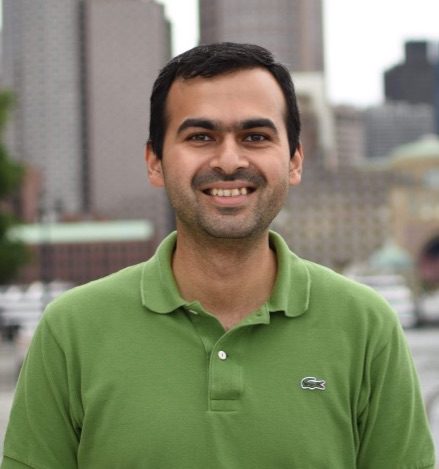Akshay Dixit, a Mittal Institute Graduate Student Associate, is a Ph.D. student of Political Economy and Government at Harvard University. He is a James M. and Cathleen D. Stone Ph.D. Scholar in Inequality and Wealth Concentration and a recipient of the Amartya Sen Fellowship for Students from India. He is interested in studying how people form beliefs about fairness and inequality and how that shapes their support for redistributive policies. In ongoing research with Rachel Brulé, he is examining the effect of climate change-induced weather shocks on women’s collective political engagement in Bangladesh.
In the past, Akshay has done research on youth civic engagement and accountability in public services, as a Research Fellow at Harvard Kennedy School, and prior to that at Save the Children. He spent two years in Bangladesh as a Research Associate at Innovations for Poverty Action.

Akshay Dixit, Mittal Institute Graduate Student Associate.
The Mittal Institute sat down with Akshay to learn more about his research and future aspirations.
Mittal Institute: Akshay, welcome back to your second year as a GSA. Can you elaborate on your research interests?
Akshay Dixit: Thank you very much! It is great to be back. My research is primarily motivated by the big-picture question of how people form opinions about policies. I’m fascinated by the kinds of economic and political forces that influence people’s beliefs about fairness and inequality in South Asia, in turn shaping their support for some policies more than others. One example of this is nationalism, and the manner in which an individual’s attachment to their national identity might affect their beliefs about the distribution of economic resources within the nation. Recently, I’ve been exploring the beliefs that people in India hold about the source of inequality in their society, for instance whether an individual’s economic circumstances depend mainly on factors within or beyond their control. I hope to contribute to our understanding of what explains variation in these beliefs.
In addition, Rachel Brulé, a faculty member at Boston University, and I are examining the effect of climate change-induced weather shocks on women’s collective political engagement in Bangladesh. Previously, I conducted an experiment in Bangladesh where we studied the effect that participation in a local accountability initiative—one seeking to improve education and healthcare services—can have on young people’s perceptions of themselves as citizens.
Mittal Institute: How did you first become interested in studying nationalism?
Akshay Dixit: What’s interesting to me about nationalism is the incredible breadth of the term. It encompasses many varieties of attachment to one’s identity as a member of a national community. I first started to think about this in the context of redistribution. It seems quite intuitive that people’s opinions about how income or wealth should be distributed within their nation would depend on the values they associate with their nation. This, of course, leads to the question of where these values associated with the nation come from in the first place, and the extent to which they are stable or malleable. These kinds of questions are as riveting as they are complex.
Mittal Institute: This summer you spent time designing a course, which you are teaching this fall semester. Can you elaborate on this course and what it covers?
Akshay Dixit: Certainly! This fall, I am teaching a course for Economics undergraduate students on inequality and preferences for redistribution. The motivating question for the course is why economic inequality persists in modern-day democracies. Standard economic reasoning would suggest that when faced with stark inequality, relatively poor voters would favor policies to tax the wealthy. Yet this expectation is often refuted. In the U.S. and elsewhere, high levels of inequality appear to coexist with low demand for redistribution among lower income groups. Why might the poor not want to soak the rich? When might the upper classes be willing to favor redistribution? More broadly, what kinds of beliefs do people hold about how society’s economic resources should be distributed, and where do these beliefs come from?
The focus of the course, hence, is linked to my research interests. In class, my students and I interrogate the predictions of standard economic models of redistribution and spend much of our time delving into questions of how people think about inequality and economic policy. This also gives us an opportunity to discuss the role of identity, ideology, life experience, culture, and gender norms in shaping economic preferences. Along the way, we also talk about the kinds of empirical techniques that economists use to study these topics.
Mittal Institute: How has your alignment with the Mittal Institute, or your role as a GSA, benefited your research?
Akshay Dixit: It has been a real pleasure and privilege to be a part of the group of GSAs. I’ve really enjoyed connecting with other students and scholars of South Asia from such a wide range of fields. As a multidisciplinary group sharing a common interest in South Asia, we can discuss quite similar questions and themes from very different academic viewpoints, and I greatly value that diversity of intellectual community.
The Mittal Institute’s support has also helped bring together students and scholars studying economics and politics in South Asia. In my first year as a Ph.D. student at Harvard, the Mittal Institute funded a reading group on South Asian politics for Harvard and MIT students, which served as a brilliant avenue for us to discuss each other’s research and provide feedback. Beyond research, some of my first conversations about teaching the course I just described were with the GSAs, and I found those incredibly helpful. I got a lot of fabulous advice from Ronak Jain in particular, who had taught a similarly organized course the year before and could share her experience.
